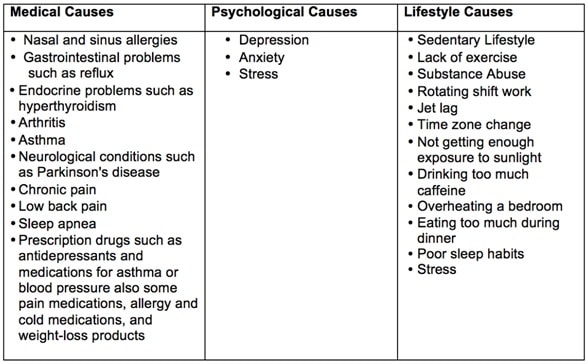Contents
In this article we will look at:
- What is insomnia?
- What are the types of insomnia and how do they occur?
- What are the causes of insomnia?
- Who is prone to insomnia?
- What are the symptoms of insomnia?
- How is insomnia diagnosed?
- What are the complications of insomnia?
- What is the treatment of insomnia?
You can click on any of the links above to navigate to the section of your interest.
What is insomnia?
Insomnia is habitual sleeplessness or inability to sleep, or a very disturbed sleep cycle. This sleep disorder can cover a range of stages of lack of sleep quality to lack of sleep quantity.
Insomnia can have tremendous adverse effects on your health and well-being. It leaves you feeling fatigued, drowsy, and depleted of energy during the day. This condition can greatly hamper your daily productivity at school or work since it affects your mood and attention levels.
You may begin to rely on sleeping tablets, or alcohol, to be able to go to sleep which can have long-term adverse effects on your physical, emotional, and mental health.
Chronic insomnia can lead to other serious health conditions such as:
Obesity
Heart disease
Stroke
Alzheimer's
Certain cancers
What are the types of insomnia and how do they occur?
There are numerous conditions which can lead to insomnia with the most common ones being anxiety, stress, and depression.
Commonly insomnia can be differentiated into the following types:
Transient insomnia: occurs when symptoms of sleeplessness lasts for up to three nights. This condition resolves by itself without treatment.
Acute insomnia: also called short-term insomnia is usually caused by a life event, such as a stressful change in a person's job, receiving shocking news, or travel exhaustion. The symptoms can persist for several weeks. This condition often resolves itself without any treatment.
Chronic insomnia: this type lasts for months, and sometimes years and thus is a long-term pattern of difficulty sleeping. A person can be said to be suffering from chronic insomnia if he has difficulty staying asleep for at least three nights per week for three months or longer. The causes of chronic insomnia can be many.
Comorbid insomnia: occurs as an effect of another condition, such as psychiatric symptoms of anxiety and depression, or certain medical conditions such as arthritis or back pain.
Onset insomnia: is a condition when a person struggles to fall asleep every night.
- Maintenance insomnia: is a condition where a person has trouble staying asleep or difficulty in falling asleep once they suddenly wake up.
What are the causes of insomnia?
The causes of insomnia include:

Who is prone to insomnia?
Some people are more prone to insomnia than others such as:
Women who suffer from PMS
Women who have experienced menopause
Elderly people
People suffering from psychological conditions such as depression
People who suffer from medical conditions such as, arthritis, allergies, asthma, back pain, gastrointestinal problems etc.
People who take certain medications such as antidepressants, or medicines for allergy, cold and weight loss
What are the symptoms of insomnia? How is insomnia diagnosed?
The symptoms of insomnia include:
difficulty falling asleep at night
waking up in the middle of the night
waking up too early
Not feeling well-rested after a night's sleep
daytime tiredness or sleepiness
irritability, depression or anxiety
difficulty paying attention, focusing on tasks or remembering
increased errors or accidents in daily life
ongoing worries about sleep
frequent urination
fatigue
nausea
Diagnosis
There is no specific test to diagnose insomnia. The doctor will first ask you about your medical history, your lifestyle, and your mental health conditions. You might have to fill out logs and questionnaires so that your sleep, lifestyle habits and mental health conditions become clear.
You may be asked to take a blood test. Based on the findings the doctor will prepare a treatment plan for you.
What are the complications of insomnia?
Insomnia may also raise your risk of developing certain health conditions, such as:
Obesity
Drug abuse
Stroke
Alzheimer's
Certain cancers
What is the treatment of insomnia?
Medical Treatment
Your doctor may prescribe medicines for insomnia depending upon other health conditions you may suffer from. He may also change your medicines or dosage of medicines for existing health problems which may be causing insomnia.
Sleeping tablets may help for a short time but cannot be taken for a prolonged period.
Please consult your doctor for advice on medications for insomnia and make sure you mention all your health conditions in detail.
Exercise
Vigorous exercising will not help you to get proper sleep and in fact, may hamper your sleep. Moderately exercising regularly for 30 minutes can give a good night’s sleep. Exercises such as moderate aerobics, swimming, a brisk walk can help.
Yoga can also help you to get proper sleep.
Patient Experiences






Questions answered by trusted doctors


Did you know?
India’s New Nightmare
In India, lifestyle is the key contributor towards insomnia, leading to an alarming rise in the number of young people, especially young executives, suffering from sleeping disorders.
Women Suffer From Insomnia More
Women are twice more likely to suffer from insomnia than men
Risk of Insomnia More Among The Elderly
The risk of insomnia increases with advancing age. It is especially prevalent among post menopausal women.
Related videos
Related articles
Rhinoplasty is known as nose job. It is a plastic surgery which helps in reconstructing and correcting the shape of the nose. Reconstructive surgery and Cosmetic surgery are the two types. Nose job helps in improving the appearance of the nose.
The treatment method of using various treatments like chemotherapy, radiation, anti-cancer drugs to either cure, treat, control, or reduce the symptoms of any types of cancer can be grouped together as cancer treatments.
Breast cancer occurs when healthy cells of breast tissue change and may begin to grow out of control which can appear as a lump within breast tissue. Breast Cancer Treatment includes chemotherapy, radiotherapy,surgery depend on the type of cancer.



